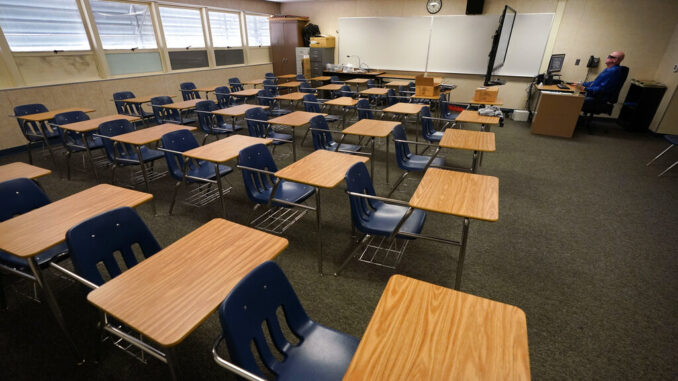

Now that Medicaid expansion has happened, there may not be a more pressing public policy issue in North Carolina than improving educational outcomes and performance for every student in our public schools.
North Carolina public school students deserve to be taught by the best teachers possible. Each student needs to not only “feel” safe but always “be safe” from attack and bullying in the classroom and hallways. Every child in public K-12 schools should graduate each year at or beyond each grade level. The basic fundamental skills of reading, writing, arithmetic and science and living in our democratic republic based on capitalism and freedom have to be the main goal of any major public education reform effort.
And yes, teachers should be paid more. A lot more. However, paying every teacher $1 million will not automatically solve all the ills of public education given the complexity of the socioeconomic problems students bring to school each day. Paying teachers more than in other regional states will certainly attract smart, accomplished teachers who will teach our children if the state can guarantee their safety in the classroom as well.
But significantly increasing teacher pay that is not tied to substantial academic reforms is an exercise in futility. Public education exists to educate our populace to become productive American citizens ― otherwise, it will lose the support of the voting public.
Since so many people are not aware of the basic structure of how North Carolina funds public education, here are some, as John Adams called them, “stubborn facts.”
It costs $60 million to raise teacher pay statewide by 1%. Raising teacher pay to compete with average salary levels in Virginia and Georgia would cost about $1.2 billion more per year ― in perpetuity.
This can be done ― but it means some combination of the following needs to be passed by the NCGA: spending cuts of $1.2 billion annually in Medicaid, transportation, public safety, higher education or state employee health plans; raise taxes by $1.2 billion; or take $1.2 billion more out of the proceeds of the North Carolina “Education” Lottery proceeds each year.
North Carolina has one of the highest state taxpayer-paid share of teacher pay in the nation. Southern states typically pay a higher percentage share of teacher salaries and benefits ― 63% of the total. The rest of their pay and benefits are paid by local sources (26%) and federal grants (11%).
It is the complete opposite situation up north. Northern legislatures typically pay less than 35% of the cost of the total teacher pay and benefit package from state budgets. Local governments up north bear the majority burden of the cost, which is one reason why Northern states have much higher local property taxes.
The state pays the same base salary for every teacher in North Carolina based on length of service. The difficulty in North Carolina is the wide disparity of wealthy counties that generate massive amounts of tax revenue from real estate taxes (Mecklenburg, Wake) versus smaller, more rural counties such as Hyde and Tyrrell in the east.
However, despite being relatively poor counties, the Republican-led N.C. General Assembly has added state funds to help equalize the funding disparity. Average expenditures for Hyde County students, for example, are roughly $16,000 per student. In Wake County, the per capita expenditure is $11,000.
Republicans passed the Excellent Public School Act in 2021 to train K-2 teachers in the science of reading. In 2023, there was an 18% improvement in reading skills and comprehension among this cohort of Tarheel children of all colors and races. Hispanic and black children improved scores by more than 20%.
The N.C. Department of Public Instruction under the leadership of Superintendent Catherine Truitt has just completed training under the LTRS (“Letters”) program for 44,000 elementary school teachers statewide. Every K-6 student will be taught how to read by teachers trained in the science of reading now.
Former New York U.S. Sen. Daniel Patrick Moynihan famously used to say in Senate hearings: “You are entitled to your own opinion. You are not entitled to your own set of facts.”
Public education policy is confusing enough without overt politicization of every single thing nowadays. The only thing that matters is educating our youth to become independent thinkers and productive citizens in our country.
Beginning with a full set of facts is a good way to start.



